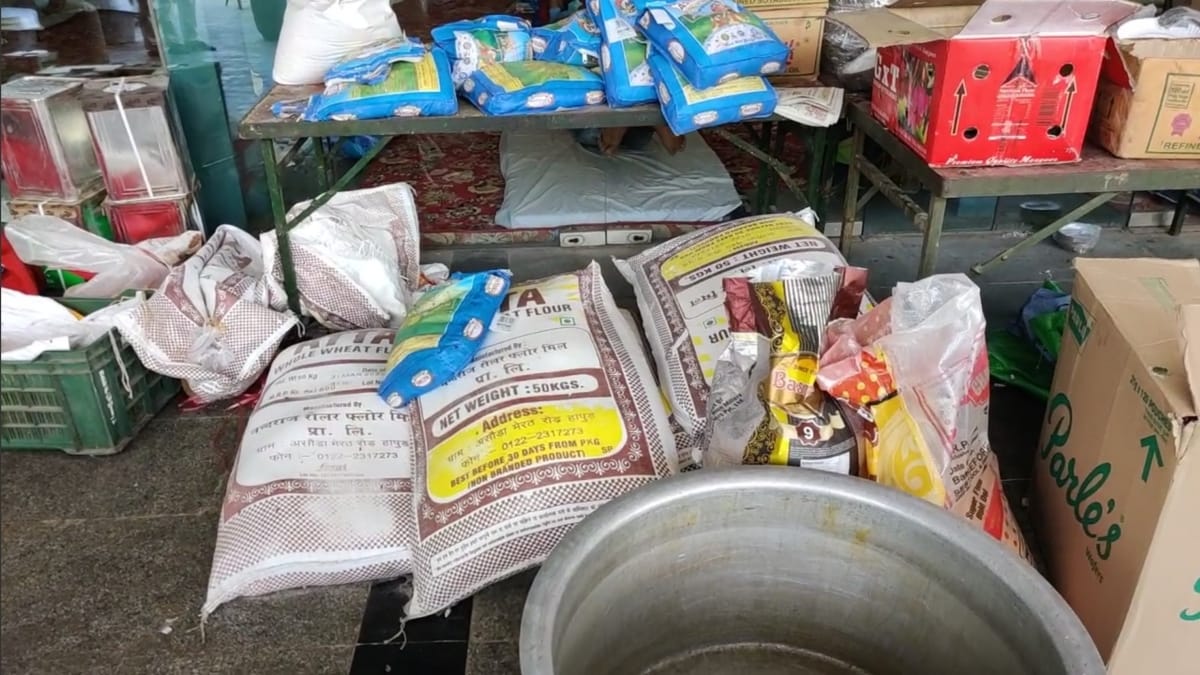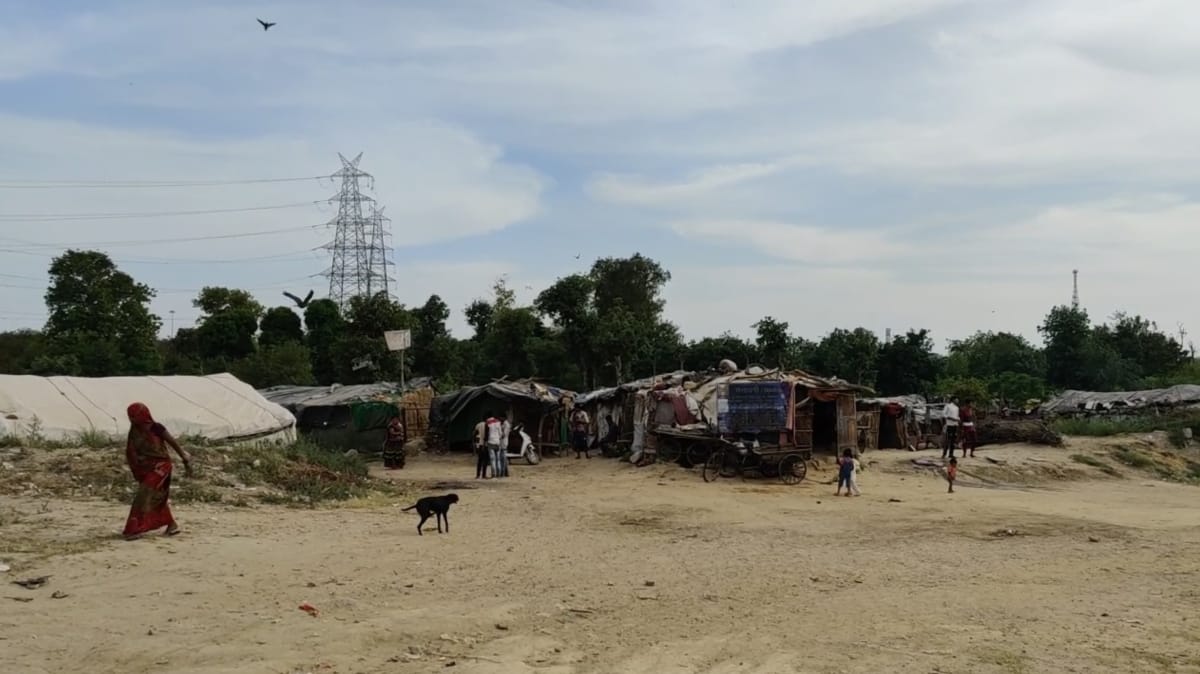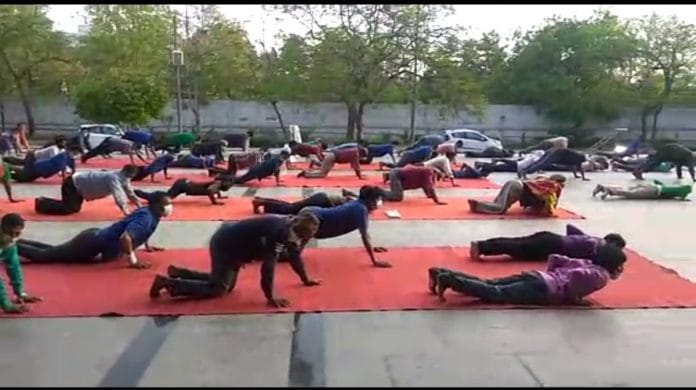New Delhi: Nestled in East Delhi’s Surajmal Vihar is Yamuna Sports Complex, which has now been turned into a shelter accommodating around 300 migrant labourers.
Known as the ‘District Shahdara Shelter Home’, it provides the labourers with all the essentials — food, water, medicines, sanitary napkins, milk and diapers for children.
But the shelter didn’t stop at just that. It has also been conducting regular health check-ups, PT (physical training) sessions, counselling and even magic shows.
A senior management official of the complex, who didn’t want to be named, told ThePrint they pay special attention to the mental health of these workers.
“We try to maintain a disciplined environment so that the workers can lead a healthy, routined life. To make sure they don’t get depressed, we have hired a magician who comes everyday in the morning and entertains the workers. In fact, some of them have shown interest in learning magic tricks too,” the official added.
“We have plans to conduct skill training for the workers so that when they go out, they can lead better lives,” he said.
The shelter is also constantly being monitored by health officials and civil defence personnel who work in two shifts.
The civil defence officials make announcements at regular intervals to remind the workers about maintaining social distancing and hygiene by changing their clothes and bedsheets.
Besides, a doctor, accompanied by a dresser, and a pharmacist are always present at the shelter to conduct regular health checkups of the migrants.

Also read: ‘Better to die with families’ — no food or money, Delhi migrants prefer the long walk home
Counselling, magic shows & PT sessions
The shelter also houses beggars and the homeless, besides migrant workers.
Some of these workers are drug addicts, and the health officials are taking special care to help them cope with withdrawal symptoms.
“We conduct counselling sessions for the workers on a regular basis where we speak to them regarding their fears and anxieties. In severe cases of withdrawal symptoms like tremors and bowel dysfunction, we transfer the addicted workers to the Institute of Human Behaviour and Allied Sciences,” said Dr Bindiya, who conducts health check-ups at the shelter.
Dr Bindiya said she also holds sessions to make the workers understand what Covid-19 is all about, why they have been kept at the facility and the importance of social distancing.
Anil Yadav, a painter by profession, gave details of his daily routine at the shelter.
“We wake up at 7 am everyday, practise yoga and then eat our breakfast while watching a magic show. Lunch is served at 12 noon, followed by a physical training session in the afternoon. Dinner is served to us at 8 pm,” Yadav said.
“We definitely feel lonely and sad at times since we are away from our families but doing yoga and watching the magician perform lightens up our mood. Our kids love the magic show. Some of us have even started gaining interest in magic. In our daily lives outside, we do not get food, shelter and entertainment all together in one day,” said another migrant worker.
Migrants happy with the authorities
Nafisa (who didn’t tell her surname) is a mother of five children and has been staying at the shelter for the last 10 days. She was one of those who got stranded in Delhi due to the lockdown, while returning from Ajmer Sharif dargah in Rajasthan.
“The officials here have been kind to us. They provide our children with milk and biscuits whenever we ask. They also give us sanitary napkins to use and provide diapers for the infants,” said Nafisa, a Bihar native.
Civil defence official Anjali (who only goes by one name) told ThePrint she monitors the supply of sanitary napkins for the women.
“We try to handle the situation very delicately, we know we can’t be harsh to them, it’s not their fault. I ask the women regularly if they need sanitary napkins and then personally hand the packets over to them,” she added.
Urfan Khan, a native from Bihar, echoed Nafisa and said the management has been really kind to them.
“We want to go back to our homes but the officers say that it is important for our health and others that we stay here for sometime. We are very happy because they give us food, water, clothes, blankets and medicines, which are difficult for us to avail otherwise,” said Khan, who is physically challenged.
He said the management has also allowed him to keep his puppy on the premises. “The officers always provide the dog with biscuits and let him play outside.”
‘Worry about family back home’
The workers at the shelter, however, worry about the conditions of their families back home as they have been unable to send them money after losing jobs due to the lockdown. The migrant workers at the facility are from Bihar, Uttar Pradesh and Rajasthan.
Shamsher Ali, a semi-precious stone trader, has been staying at the facility with his 5-year-old granddaughter since 1 April.
“I bought stones worth Rs 15,000, but now I can’t sell them due to the lockdown. My family is living without a roof in Bihar as we couldn’t complete our house construction due to the lockdown. I don’t know what to do, I am eating well here but my family is debt-ridden and starving at home,” said Ali, a native of Bihar.
“My wife and children are in Bihar, I haven’t been able to send them any money or go home. I know they are starving, I can’t express how worried I am,” said another migrant worker.
Life comes to a halt in the Yamuna slums
Few kilometres away from the shelter home are several jhuggi clusters along the Yamuna river, and the lives of the slum-dwellers there stand in sharp contrast with those at the shelter.
The slum-dwellers told ThePrint the government officials had come only once to give them ration and now they have to survive on one or two small meals a day.

“We were given only 5 kg atta (flour) and 5 kg rice but we are a family of eight people. How will we survive on this much of ration? We don’t even have oil and salt to cook our food,” said Savitri (who goes by only one name).
“Corona corona karke hum jaise public ko maar do. Kal dopahar se kuch nai khaya hai humne (In the name of coronavirus, just kill us. We haven’t eaten a single morsel since yesterday afternoon),” said another slum-dweller, Rita (who also goes by only one name).
She added that no health officials have visited the area and they have absolutely no access to clean water, medicines, masks and other essentials.
“Our daily earnings have stopped. We have stopped cooking dinner since we have no money even to buy candles in order to survive the night,” Rita added.
Due to lack of space, these people are staying together in groups of 10-15 in their huts — defying all calls for social distancing.
Gul Badan, a physically challenged woman, told ThePrint, she has been suffering from fever, but is scared to go to doctors for fear of being isolated from her family “in the name of corona(virus)”.
Also read: Homeless with no income, migrant labourers wish they had left Delhi before the lockdown






